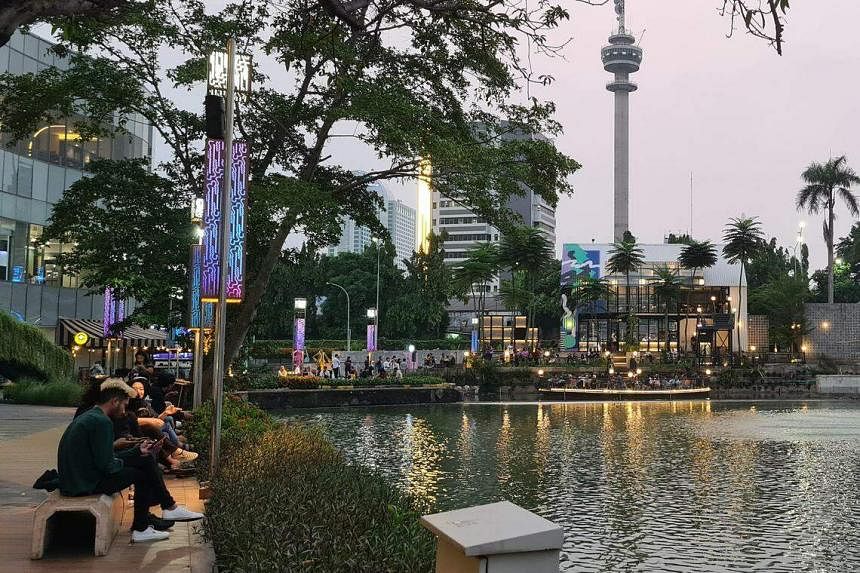JAKARTA – Indonesian presidential candidate Prabowo Subianto wiggled with delight in video clips viewed by millions on TikTok.
As part of an unorthodox campaigning style, the Defence Minister, 72, has danced not only at his birthday party or at work, but also at events attended by many politicians and his supporters. He once said that his dancing was inspired by Gatotkaca, a Javanese puppet hero.
Campaigning for the presidential election kicked off officially on Nov 28.
Netizens have a new nickname for him – “gemoy”, a pun on gemas, an Indonesian slang term widely used by youngsters to mean cute or adorable.
Mr Prabowo has also invited social media influencers and comedians to his office, sharing jokes and laughs with them. In an Instagram post, he wore a white hoodie bearing his party name, Gerindra, instead of his regular safari suit.
“My friends say his dance is part of a political strategy. But I believe it comes out as a spontaneous expression. I just find it fun,” university student Noval Danu Prawira, 21, told The Straits Times. He will vote for the first time in the Feb 14, 2024, polls.
From visiting schools and campuses to engaging young campaigners and social media influencers and appearing on TikTok, Indonesia’s presidential and vice-presidential candidates are banking on new approaches to woo first-time voters and the plugged-in generation.
Widespread mobile phone ownership and high Internet penetration allow the politicians to reach out to even those living in remote corners of the vast archipelago of some 17,000 islands.
They aim to win the hearts of 106.4 million young voters aged 17 to 40 years old, who represent 52 per cent of eligible voters in total.
Winning votes from the group is key to victory, analysts say.
“With a minimum ideological base, the youth are clearly part of swing voters. This is especially true for first-time voters with no prior (voting) experience,” said Mr Edbert Gani Suryahudaya, a political researcher at the Centre for Strategic and International Studies (CSIS) think-tank.
The candidates are also expected to address “substantive issues” on the minds of young voters during their campaigns, said Dr Kunto Adi Wibowo, a political communication expert from Padjadjaran University.
“Gimmicks only serve as an attention seeker to draw young people to the candidates. At the end, when they can catch their attention, the next question is what will they convey to the youth,” he said.
Mr Prabowo, who is running for the third time to be president, is pairing up with Solo Mayor Gibran Rakabuming Raka, 36, the elder son of President Joko Widodo. Mr Widodo has hit the two five-year term limit and cannot seek re-election.
The other two pairings are former Central Java governor Ganjar Pranowo, 55, and his running mate, Chief Security Minister Mahfud MD, 66; and former Jakarta governor Anies Baswedan, 54, and his vice-presidential candidate, former manpower minister Muhaimin Iskandar, 57.
Mr Ganjar and Mr Anies on Nov 24 held a dialogue with hundreds of students and professionals at the Indonesia Millennial and Gen Z Summit in Jakarta. The former promised to enhance the country’s education and digital infrastructure.
“We will have highly qualified human resources if they are educated and healthy,” said Mr Ganjar.
The event followed his trips to eastern Indonesia, including its poorest province of Papua, where he met and greeted the youth.
Mr Ganjar, who was nominated by the country’s ruling party, the Indonesian Democratic Party of Struggle, has of late created a buzz by appearing in popular cooking and comedy TV shows. He has drawn support from a volunteer group of prominent musicians and artists called Extravaganjar.
A 23-second TikTok clip depicts Mr Ganjar and his cheering supporters – all dressed in black – making the three-finger salute featured in US film series The Hunger Games. “It’s not about Ganjar. It’s not about power. It’s about Indonesia,” a text in the clip reads.
Mr Anies, meanwhile, is in a TikTok clip showing him joke with Mr Muhaimin about the sarong, a popular fabric worn by students of Islamic boarding schools.
On Sept 19, together with Mr Ganjar and Mr Prabowo, Mr Anies went to Gadjah Mada University in Yogyakarta to address around 5,000 students.
“Young people have a lot of business ideas, but they will face obstacles if we don’t change the rules (of doing business),” said Dr Anies, formerly a rector of a private university in Jakarta.
Mr Gani of CSIS said the candidates are focusing on “popular approaches”, such as TikTok, which deliver messages “briefly and instantly”.
“The method is undoubtedly quite successful to lure first-time voters,” he said, adding that for more experienced voters, the tactic might also effectively transform the image of each presidential candidate, particularly Mr Prabowo.
The youth being targeted are watching the polls closely and have voiced what they want from the next president.

Jakarta-based freelance writer Juan Satya, 24, wants a leader who can generate “as many jobs as possible”, especially for young people like him.
“I have a bachelor’s degree, but still it’s not easy to get my desired job. Companies usually offer only a few positions, but there are a lot of applicants, so the competition is really tough,” he told ST.
Concerns about employment are not unique to residents of urban areas.
Mr Noval, who moved from rural Brebes regency in Central Java province to Jakarta to study two months ago, said many of his peers back home have failed to get jobs despite the rise of a new industrial estate nearby.
The new president, he said, would need “to distribute job opportunities equally” between the young and the older workforce, he said.
About 5.3 per cent of the 147.7 million-strong Indonesian workforce, or about 7.9 million people, were unemployed at the end of August, according to Statistics Indonesia.
For Mr Noor Arasy, although he had landed a job two months after graduating from university, his salary of five million rupiah (S$432) is around Jakarta’s minimum wage, which he described as “just enough to get by”.
Living with his parents in Bekasi, West Java, allows the 22-year old to save one-fifth of his monthly income. But he sees his bigger goal of buying an apartment being out of reach, as it would cost at least 300 million rupiah in the outskirts of Jakarta.
“I really cannot put all my hard work just to buy an apartment whose price keeps surging. I have other aspirations,” he said, noting that the presidential candidates must address the difficulty of owning a house faced by young people.
These concerns dovetail with the result of a CSIS survey in 2022 that young Indonesian voters were concerned most about welfare issues, job creation, corruption eradication and climate change.
In addition to bread-and-butter issues, Mr Juan, the freelance writer, also sees tackling corruption as a key government priority.
“Corruption takes away resources that can be used to fund important sectors like health,” he said. “Young voters need to check the track record of candidates to see if in the past they were implicated in corruption cases.”


